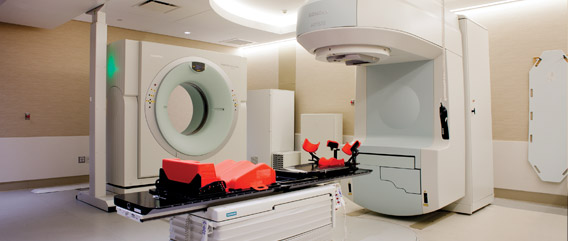New Center Offers Individualized and Precise Radiation Oncology Treatment
The new Irving Radiation Oncology Center, part of the Herbert Irving Comprehensive Cancer Center, opened last fall to provide patients with high-precision radiation therapies and the most advanced diagnostic imaging for children and adults with cancer.
The center’s new technology allows clinicians to safely and precisely target smaller tumor volumes with higher dose radiation, while sparing healthy cells from unnecessary radiation exposure. Image-based target verification technology allows physicians to individualize treatment to each patient, allowing maximization of the treatment dose. In-room, real-time imaging can monitor the tumor response and biological behavior as the patient is being treated.
“This new technology offers greater customization and allows for a dramatically reduced treatment course, from weeks to days,” says K.S. Clifford Chao, MD, the Chu H. Chang Distinguished Professor and chair of radiation oncology at P&S.
The 12,500-square-foot Irving Radiation Oncology Center is an extension of NewYork-Presbyterian’s existing radiation oncology space, which has been renovated, and is housed on the lower level of the Morgan Stanley Children’s Hospital. Unlike most radiation oncology treatment centers, the Irving Center is open and filled with natural light. Patients, family, and caregivers have access to computers, Wi-Fi, and an interactive children’s sitting area while waiting
for appointments.
The center was made possible through a $25 million gift to NewYork-Presbyterian Hospital from Herbert Irving, for whom the National Cancer Institute-designated Herbert Irving Comprehensive Cancer Center is named, and his wife, Florence. Mr. and Mrs. Irving have advanced cancer care by giving more than $200 million to NewYork-Presbyterian Hospital and Columbia University Medical Center over the past 30 years.
“The Irving Radiation Oncology Center reflects Herbert and Florence Irving’s vision that the most promising way to reduce the global burden of cancer requires the top researchers to work side by side with top clinicians, all in modern facilities,” says Lee Goldman, MD, executive vice president and dean.
- Log in to post comments


